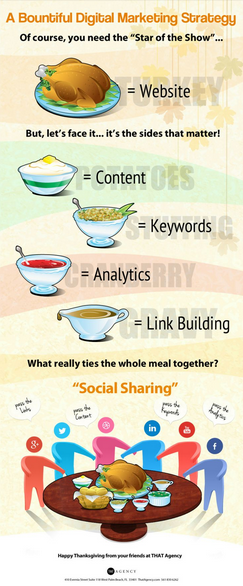The "Microsoft Grand Canyon" doesn't exactly have a pleasant ring to it. That's because the world of marketing can sometimes be, well, unpleasant. In fact, we'd venture to guess that most marketing is invasive, annoying, and in the case of corporations buying up national parks — not an appealing idea. However, marketing can do good things, especially for small companies looking to grow their business. 
With Thanksgiving being tomorrow, we'd like to take this opportunity to give thanks for turkey stuffing with bits of sausage in it, pecan pie, and innovations (17 of them) that make marketers' lives a bit easier. If it wasn't for these bright ideas, we'd all still be cold-calling.
- Free stuff. Not exactly rocket science, but since the first salesman/caveman gave away a free wheel, this is still one of the most powerful.
- Facebook's "Share" button. Instant, free PR to hundreds at the click of a button. And you didn't have to pay them!
- The hashtag. Allowing marketers to group similar content together for an ADD public. Not as good as turkey stuffing with bits of sausage in it, however.
- LinkedIn (for lead generation.) Hundreds of people voluntarily handing you prospecting gold? What's the catch?
- Search and site retargeting. What probably sounded creepy once it was first deployed, retargeting is now an unassuming fact of life. And that warms marketers' hearts.
- Big data. Amazon, in particular, led the way in customizing product recommendations based on similar purchases. Marketers have surely taken note.
- Amazon's 1-click. The retail giant also made a lot of their suppliers happy by rolling out their one-click purchasing button: nice, quick, and convenient. (Other e-retailers, of course, are emulating this approach, especially in the wake of 2011 lawsuit whereby Amazon lost their patent to the "1-click.") Bummer for Bezos.
- Location-based marketing. Twenty percent of all Google searches are location-related. And now since Google (and everyone else for that matter) knows where customers are at all times, marketers can roll out tremendously precise, location-based ads.
- Open source tools and platforms. Let's say it's 1998 and you want to build an online shopping cart. Where would you begin? Beats us! Luckily for small businesses and marketers alike, if there's some add-on you're looking for, odds are there's a free one out there nowadays (like Zencart for shopping carts.)
- Facebook Exchange. The social media giant's ad retargeting platform pulls data from "the four walls of Facebook." It's more effective than typical display ads and a critical ingredient in their mobile strategy. (Fun holiday fact: marketers are also grateful for mobile ads.)
- Jay Conrad Levinson's book "Guerrilla Marketing." We're kicking it old-school for a minute. This book showed that you didn't need to be a "Mad Men"-esque advertising behemoth to get peoples' attention. Needless to say it's the spiritual grandfather of social media and "viral" marketing.
- Pay-per-click. Normally marketers wouldn't be thrilled to pay someone unless they had to. In this case, they're paying a third-party who sent clicks their way. It's a glorified referral system, and we're grateful for it.
- Video marketing. You don't need to be an Oscar-winning cinematographer to make a compelling video nowadays, which is good because hiring an Oscar winning cinematographer for a marketing video doesn't come cheap.
- Web-based meeting software. There are some products out there that make marketing so much easier. Think of, say, Web-based meeting platforms like Go to Meeting. As much as you love Cleveland in February, now you can make the pitch from the comforts of your home office.
- "Gameification" and the proliferation of apps. Much like #13, nowadays most companies can either make their own games and apps or hire someone to build one on the cheap. And games are a tremendously powerful marketing platform.
- Analytical tools. Tools like Google Analytics have become more granular and precise, enabling marketers to make better strategic and financial decisions.
- Google Alerts (and other news aggregating sites.) It's not glamorous, but it provides companies with limitless material for creating compelling blogs, which as a cornerstone of your SEO strategy, is something marketers can get behind.
Actually, would you be particularly grateful for even more leads? Download our lead generation ebook!




